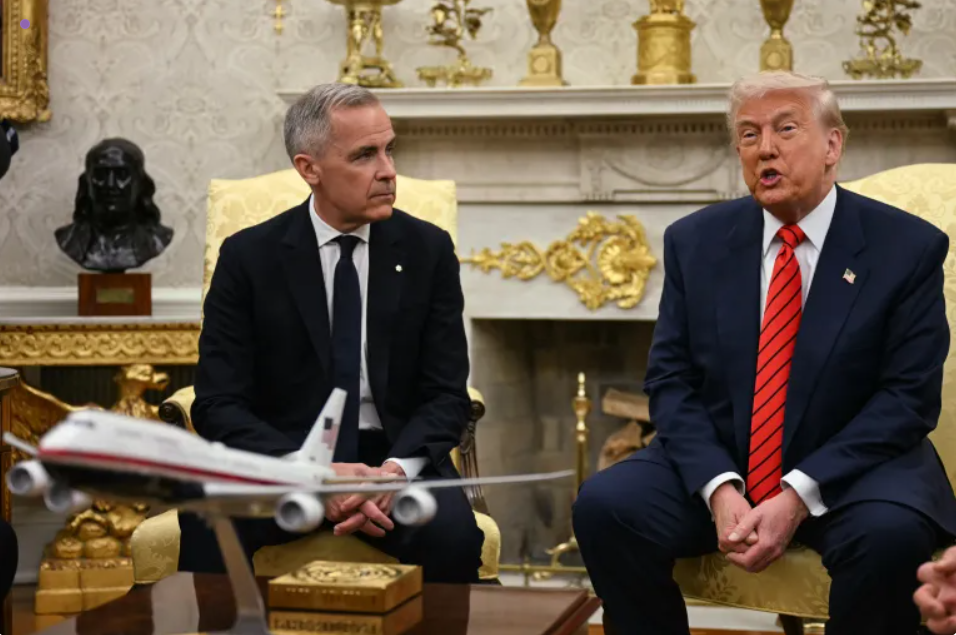(Al Jazeera Media Network) As Canada pushes ahead with a new digital services tax on foreign and domestic technology companies, United States President Donald Trump has retaliated by ending all trade talks and threatened to impose additional tariffs on exports from Ottawa.
In a post on his Truth Social platform on Friday, Trump called the new Canadian tax structure a “direct and blatant attack on our country,” adding that Canada is “a very difficult country to trade with.”
“Based on this egregious Tax, we are hereby terminating ALL discussions on Trade with Canada, effective immediately,” he wrote. He added that he would announce new tariffs of his own for Canada in a matter of days.
US companies such as Amazon, Meta, Google and Uber face an estimated $2 billion in bills under the new tax.
Trump’s decision marks a sharp return to trade tensions between the two countries, abruptly ending a more cooperative phase since Mark Carney’s election as Canada’s prime minister in March.
It also marks an escalation in the trade-as-pressure tactic under Trump’s second term in Washington.
The US is Canada’s largest trading partner by far, with more than 80 percent of Canadian exports destined for the US. In 2024, total bilateral goods trade exceeded US$762 billion, with Canada exporting $412.7 billion and importing $349.4 billion – leaving the US, which counts Canada as its second-largest trading partner, with a goods deficit of $63.3 billion.
A disruption due to tariffs on products like automobiles, minerals, energy or aluminium could have large ripple effects across both economies.
Canada’s Digital Services Tax Act (DSTA) came into force in June last year. It is a levy on tech revenues generated from Canadian users – even if providers do not have a physical presence in the country.
The DSTA was first proposed during the 2019 federal election under then-Prime Minister Justin Trudeau, and received approval in Canada on June 20, 2024. It came into force a week later, on June 28. The first payments of this tax are due on Monday, June 30, 2025.
Large technology firms with global revenues exceeding $820 million and Canadian revenues of more than $14.7 million must pay a 3 percent levy on certain digital services revenues earned in Canada. Unlike traditional corporate taxes based on profits, this tax targets gross revenue linked to Canadian user engagement.
Digital services the levy will apply to include: online marketplaces, social media platforms, digital advertising, and the sale or licensing of user data.
One of the most contentious parts of the new framework for businesses is its retroactive nature, which demands payments on revenues dating back to January 1, 2022.
On June 11, 21 US Congress members sent a letter to President Trump, urging him to pressure Canada to eliminate or pause its Digital Services Tax. “If Canada decides to move forward with this unprecedented, retroactive tax, it will set a terrible precedent that will have long-lasting impacts on global tax and trade practices,” they wrote.
Then, in a Truth Social post on Friday this week, Trump said Canada had confirmed it would continue with its new digital services tax “on our American Technology Companies, which is a direct and blatant attack on our Country.”
He added that the US would be “terminating ALL discussions on Trade with Canada, effective immediately” and that he would be levying new tariffs of his own on Canada within seven days.
“They have charged our Farmers as much as 400% Tariffs, for years, on Dairy Products,” Trump said, adding, “We will let Canada know the Tariff that they will be paying to do business with the United States of America within the next seven day period.”
Later, at the Oval Office, Trump doubled down, saying: “We have all the cards. We have every single one.” He noted that the US holds “such power over Canada [economically]”. “We’d rather not use it,” Trump said, adding: “It’s not going to work out well for Canada. They were foolish to do it.
“Most of their business is with us, and when you have that circumstance, you treat people better.”
Trump also said he would order a Section 301 investigation under the Trade Act to assess the DSTA’s effect on US commerce, which could potentially lead to other punitive measures.
On Friday, White House National Economic Council director, Kevin Hassett, told the Fox Business Friday program: “They’re taxing American companies who don’t necessarily even have a presence in Canada.”
Calling the tax “almost criminal”, he said: “They’re going to have to remove it. And I think they know that.”


